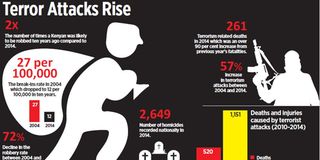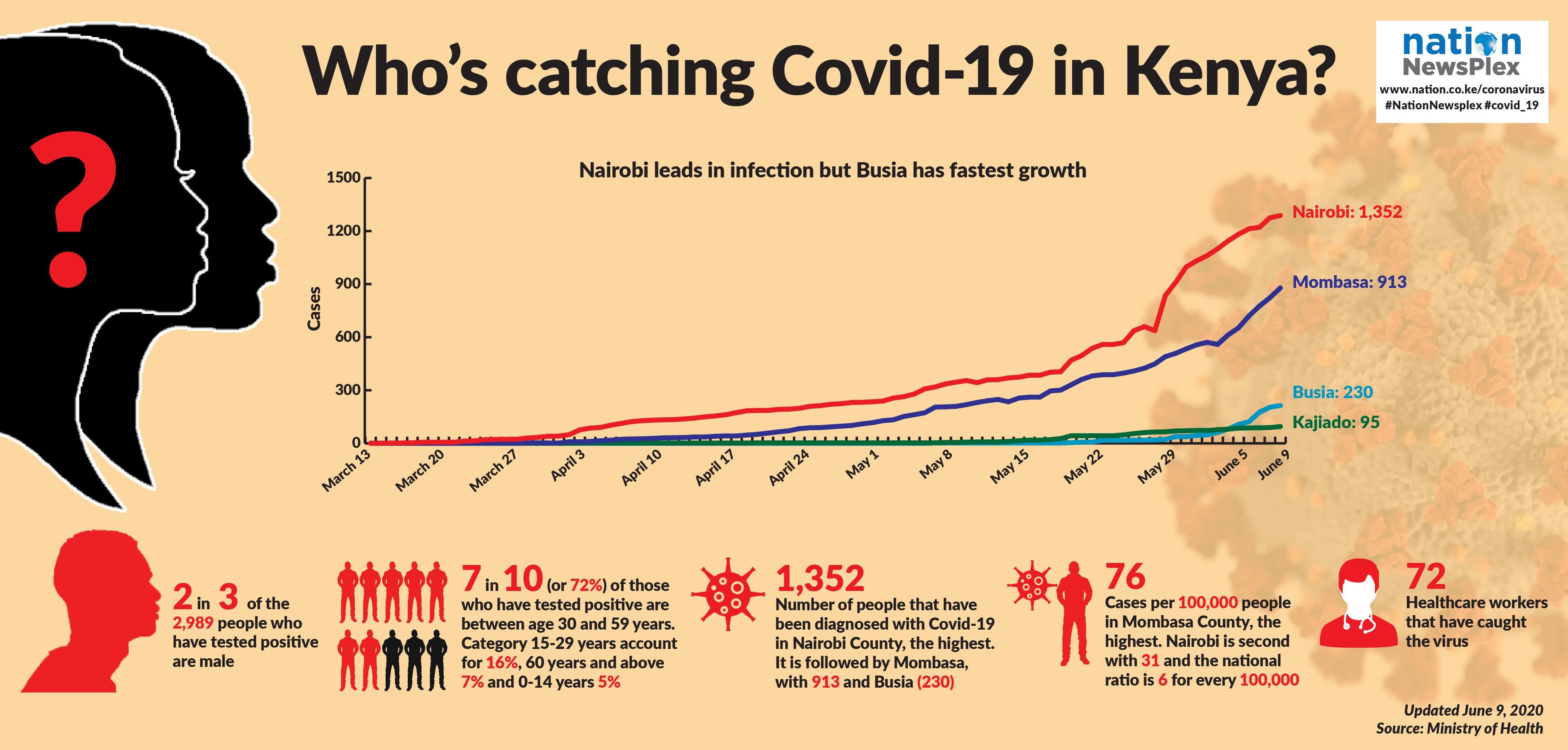Non-terrorist crime drops as terror incidents rise

GRAPHIC | LISA WAMUGUNDA
What you need to know:
- The rate of common crime such as robberies, vehicle theft, break-ins, assaults and homicides have mostly been trending downwards in the last decade.
- Kenyans and businesses have responded to the fear of terrorism by investing increasing amounts of their money in private security services.
- From churches to hospitals to shopping malls and offices, Kenyans undergo security checks everywhere.
In the midst of horrific terrorist attacks, Kenyans had an unexpected gain − a drop in incidents of crime.
Are the two issues just coincidental, or are activities to combat terror having an impact on levels of crime in the country?
Ten years ago a Kenyan was three times as likely to be robbed and two times as likely to have their car stolen as they are today.
The chance that their house would be broken into was double what it is today. The threat of terrorism has created a perception among Kenyans that crime is out of control but a review of crime data from the Kenya National Bureau of Statistics (KNBS), tells a different story.
“Can he get in safely, can he get out and can he get the target of his desire?”
The rate of common crime such as robberies, vehicle theft, break-ins, assaults and homicides have mostly been trending downwards in the last decade.
In 2004, the robbery rate peaked at 23 per 100,000. Then it dropped almost continuously, reaching 7 per 10,000 last year. During the same period break-ins rate dropped from 27 per 100,000 to 12 while the vehicle and other theft rate fell from six per 100,000 to three.
The robbery rate, which fell by 72 per cent between 2004 and 2014, recorded the biggest reduction. It was followed by vehicles and other theft rate which dropped by 55 per cent, break-in rate which reduced by 25 per cent and homicide rate declined by 18 per cent.
But, going against the grain, the rate of rape and defilement rose by 26 per cent.
To explain the decline, police point to their efforts in the war on crime including better policing strategies such as community policing. The government also claims credit, pointing to a strong economy and improved employment for youth. According to the Economic Survey 2015 the economy generated an extra 799,700 thousand new jobs in 2014.
Perhaps all of these things work together to help explain falling crime rates, but there is another factor that has gone largely unnoticed – efforts by private citizens, businesses and organisations to fortify themselves against the threat of terrorism.
Kenyans and businesses have responded to the fear of terrorism by investing increasing amounts of their money in private security services. Today one can hardly access any facility without being frisked with metal detectors or passing through a scanner.
From churches to hospitals to shopping malls and offices, Kenyans undergo security checks everywhere.
Individuals, businesses, churches and other organisations have invested heavily in metal detectors, closed-circuit television (CCTV), electronic intrusion detection equipment, X-ray devices, computer security equipment, vehicle protection equipment and other types of security technology.
But these measures may be deterring common crime more than terrorism. Indeed while the rates of common crimes are largely going down as data above shows violence from terrorism is on a steep rise.
Data from the Global Terrorism Database, established by the National Consortium for the Study of Terrorism and Responses to Terrorism, reveal that there has been a steep increase in terrorism attacks since 2011, with the worst year being 2014, when Kenya experienced 115 incidents up from two in 2005.
The attacks have also become more lethal. In 2010 there were eight terrorism deaths and 49 injuries compared to last year, when there were 261 deaths and 322 injuries.
Statistics from January-July this year suggests that the trend may continue. In this period there has been more than five terrorist attacks which have resulted in 168 deaths.
How could it be that terrorism violence is going up will other forms of crime are falling? The answer perhaps lies in the difference between someone who robs or assaults another person and someone who commits an act of terrorism is the intention of the perpetrator and desired result.
A normal criminal wants to get away with crime, but a terrorist does not care.
The head of security at Nation Media Group, Samuel Matano, explains that a criminal considers three things before he goes ahead with his or her mission. “Can he get in safely, can he get out and can he get the target of his desire?” he asks. “If the answer is no to any one of these three then the criminal’s desire to go ahead with his mission is diminished.” Matano says terrorists do not care about getting out.
Further, saysthe CEO of Eye-on-Eye Security and security consultant Mwenda Mbijiwe,normal criminals are deterred by the chance of being identified and caught later, but terrorist do not care about getting identified and caught.





